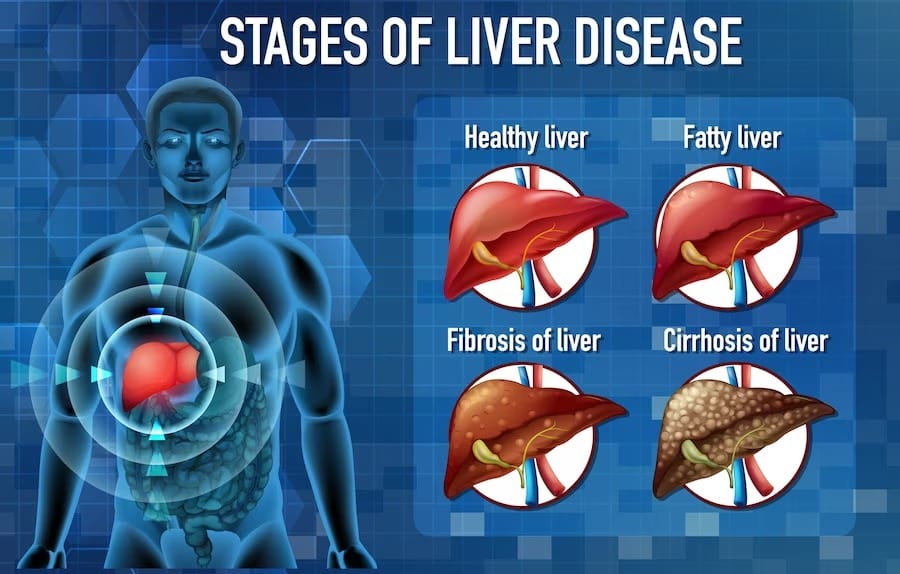
Liver disease is a serious and potentially life-threatening condition that affects millions of people around the world. It is important to identify this condition as quickly as possible so that proper treatments can be administered and the best outcomes for patients can be achieved. This article provides an overview of the symptoms and diagnosis of liver disease in humans. We will discuss how to identify signs of liver disease, what tests are available to diagnose with the best medical testing laboratory in Punjab, and how physicians evaluate a patient’s risk level for developing further complications. Finally, we will provide some tips on how you can take proactive steps to prevent or reduce your risk of developing liver disease.
Liver disease is a broad term that covers any disorder of the liver. The liver is a vital organ that helps the body process food, absorb nutrients, and remove toxins.
Types of Liver Disease
There are many types of liver disease, all of which can lead to liver failure if left untreated. The most common types of liver disease include:
- Alcoholic Liver Disease: This is the most common type of liver disease in the Western world and is caused by excessive alcohol consumption. Symptoms include abdominal pain, fatigue, jaundice, and weight loss.
- Hepatitis: There are several types of hepatitis viruses that can lead to liver damage and failure. The most common are hepatitis A, B, and C. Symptoms include fever, fatigue, abdominal pain, jaundice, and dark urine.
- Fatty Liver Disease: This occurs when there is an accumulation of fat in the liver cells. It is often seen in people who are obese or have diabetes. Symptoms include fatigue, abdominal pain, and yellowing of the skin (jaundice).
- Cirrhosis: This is a late stage of alcoholic liver disease or other chronic liver diseases characterized by scarring of the liver tissue. It can lead to liver cancer or death if left untreated. Symptoms include fatigue, weakness, weight loss, bruising easily, and bleeding from the gastrointestinal tract.
Symptoms of Liver Disease
There are a variety of symptoms that can be associated with liver disease. These can include:
- Fatigue
- Loss of appetite
- Nausea and vomiting
- Weight loss
- Abdominal pain and bloating
- Spider Like blood vessels on the skin
- Swelling in the ankles, feet, or legs
Diagnosing Liver Disease
There are a few different ways that doctors can diagnose liver disease in humans. The most common way is to do a physical examination and take a medical history. Doctors will also order blood tests to check for elevated liver enzymes. If the blood tests come back normal, doctors may order imaging tests, such as an ultrasound or CT scan, to look for signs of liver damage for all the tests visit the best medical testing laboratory in Punjab,
Treatment for Liver Disease
There are many different treatments for liver disease, depending on the cause and severity of the disease. In some cases, treatment may only be necessary to relieve symptoms and prevent further damage to the liver. In other cases, treatment may involve a combination of medication, lifestyle changes, and surgery.
- Medication: Medications are often used to treat liver disease, particularly if it is caused by a virus or autoimmune disorder. antiviral drugs may be used to treat hepatitis C, while corticosteroids or other immunosuppressive drugs may be used to treat autoimmune hepatitis. Other medications that may be used to treat the liver disease include antibiotics (if there is an infection), pain relievers, and blood-clotting agents.
- Lifestyle changes: If you have liver disease, it is important to make lifestyle changes in order to protect your liver and improve your overall health. These changes may include quitting smoking, avoiding alcohol, eating a healthy diet, exercising regularly, and losing weight if you are overweight.
- Surgery: Surgery may be necessary in some cases of liver disease. For example, surgery may be needed to remove a portion of the liver that is damaged beyond repair or to implant a device that helps the liver function properly.
Prevention of Liver Disease
Liver disease can be prevented by maintaining a healthy lifestyle and avoiding risk factors such as obesity, diabetes, and excess alcohol consumption. Vaccination against hepatitis B is also recommended for individuals at risk of liver disease. Regular checkups with a healthcare provider can help to identify liver disease early and allow for prompt treatment.
Conclusion
In conclusion, diagnosing liver disease in humans can be difficult and complex. It involves a variety of tests, from blood tests to ultrasounds and biopsies for all tests at the best medical testing laboratory in Punjab, However, with the right tools it is possible to accurately diagnose and treat any potential underlying issues within the liver. Early detection is key when it comes to liver health, so if you experience any unusual symptoms or believe yourself at risk for liver damage then consulting a healthcare professional should be your first step toward getting back on track
